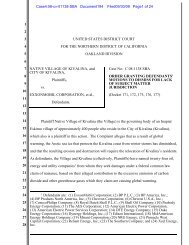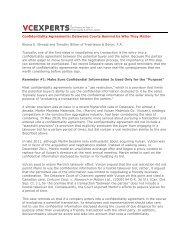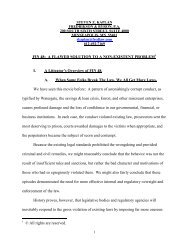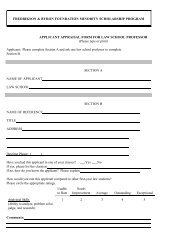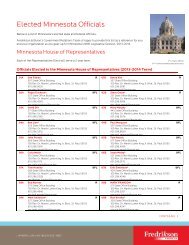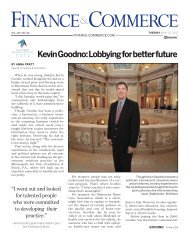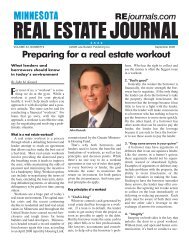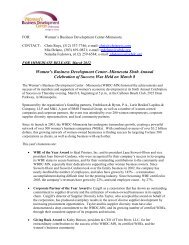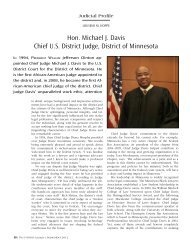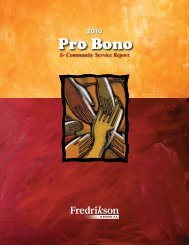Pursuing the Predators: Regulators Response to Mortgage Fraud
Pursuing the Predators: Regulators Response to Mortgage Fraud
Pursuing the Predators: Regulators Response to Mortgage Fraud
Create successful ePaper yourself
Turn your PDF publications into a flip-book with our unique Google optimized e-Paper software.
<strong>Mortgage</strong> <strong>Fraud</strong><br />
Illustration by Imagezoo © Images.com<br />
For many people, becoming a homeowner<br />
is what <strong>the</strong> great American<br />
dream is all about. Like <strong>the</strong> three<br />
little pigs in <strong>the</strong> fairy tale, we grow<br />
up, leave our families and venture out<br />
in<strong>to</strong> <strong>the</strong> world, aspiring <strong>to</strong> obtain a beautiful<br />
home where we can raise our children.<br />
During <strong>the</strong> first half of <strong>the</strong> decade<br />
that dream became approachable for<br />
many families as interest rates plummeted.<br />
Subprime lenders and mortgage brokers<br />
devised creative strategies <strong>to</strong> enable<br />
people with lower incomes and bad credit<br />
his<strong>to</strong>ries <strong>to</strong> obtain mortgages. As <strong>the</strong><br />
more recent slump in <strong>the</strong> housing market<br />
reflects, however, many of those creative<br />
(and risky) strategies have failed and contributed<br />
<strong>to</strong> a sharp spike in foreclosure<br />
rates nationwide. A growing number of<br />
consumers are discovering <strong>the</strong>y might<br />
lose <strong>the</strong>ir homes, unable <strong>to</strong> sustain <strong>the</strong>ir<br />
obligations as interest and property tax<br />
rates increase and introduc<strong>to</strong>ry teaser<br />
rates on adjustable-rate mortgages vanish.<br />
According <strong>to</strong> RealtyTrac, Inc., foreclosure<br />
rates nationally rose 27 percent in<br />
<strong>the</strong> first quarter of 2007 over <strong>the</strong> previous<br />
quarter and were up 35 percent from <strong>the</strong><br />
same period in 2006. Foreclosure rate<br />
increases in Minnesota were even more<br />
startling, reflecting a 35 percent increase<br />
over <strong>the</strong> previous quarter and as much as<br />
a 130 percent increase over <strong>the</strong> first quarter<br />
of 2006. The spike in foreclosures and<br />
a related downturn in <strong>the</strong> housing market<br />
have sent ripple effects throughout<br />
<strong>the</strong> national economy, causing regula<strong>to</strong>rs<br />
and consumer advocacy groups <strong>to</strong> stand<br />
up and take notice. Everyone is pointing<br />
a finger at someone and asking, “Who is<br />
<strong>to</strong> blame?”<br />
No Single Villain<br />
In actuality <strong>the</strong>re is no single “big bad<br />
wolf” who is responsible for <strong>the</strong> crisis in<br />
<strong>the</strong> housing market, but ra<strong>the</strong>r, many<br />
players are involved. The one thing that<br />
regula<strong>to</strong>rs all appear <strong>to</strong> agree upon, however,<br />
is that fixing <strong>the</strong> problem demands<br />
clamping down on preda<strong>to</strong>ry lending<br />
practices and ramping up enforcement<br />
actions against mortgage fraud.<br />
<strong>Mortgage</strong> fraud can take many different<br />
forms, and may be perpetrated by a<br />
variety of players. <strong>Mortgage</strong> fraud investi-<br />
gations frequently target mortgage brokers,<br />
who process mortgage applications,<br />
act as intermediaries between buyers and<br />
lenders, and are at <strong>the</strong> center of many<br />
transactions. Because <strong>the</strong>y are typically<br />
paid commissions for <strong>the</strong>ir services based<br />
on loan amounts, mortgage brokers are<br />
strongly motivated <strong>to</strong> obtain lenders’<br />
approval for buyers’ applications. Brokers<br />
who become overzealous in seeking such<br />
approval may find <strong>the</strong>mselves on <strong>the</strong><br />
wrong side of a civil or even criminal<br />
fraud investigation. A typical example is<br />
<strong>the</strong> broker who is alleged <strong>to</strong> have intentionally<br />
overstated <strong>the</strong> buyer’s income or<br />
assets on an application in order <strong>to</strong> dupe<br />
<strong>the</strong> lender in<strong>to</strong> approving it.<br />
This kind of approval became easier <strong>to</strong><br />
obtain with <strong>the</strong> advent of “no-documentation”<br />
or “stated-income” loan transactions.<br />
In <strong>the</strong>se transactions, a borrower<br />
pays a higher interest rate and <strong>the</strong> lender,<br />
in exchange, relies on <strong>the</strong> income representations<br />
made on <strong>the</strong> application without<br />
demanding supporting documentation<br />
or making substantial efforts <strong>to</strong> verify<br />
those representations. Minnesota<br />
At<strong>to</strong>rney General Lori Swanson argued<br />
for regulations against stated-income<br />
loans in testimony before <strong>the</strong> Board of<br />
Governors of <strong>the</strong> Federal Reserve System<br />
on June 14, 2007. According <strong>to</strong> At<strong>to</strong>rney<br />
General Swanson, <strong>the</strong> intended purpose<br />
of stated-income loans is <strong>to</strong> provide an<br />
avenue of approval for self-employed<br />
individuals and o<strong>the</strong>rs whose income is<br />
not derived from a regular paycheck subject<br />
<strong>to</strong> verification. Instead, she says, <strong>the</strong>y<br />
have become an avenue for unscrupulous<br />
brokers who have falsified applications<br />
“<strong>to</strong> claim that oc<strong>to</strong>genarians hauled in<br />
cash by making bird houses <strong>the</strong>y didn’t<br />
make or cleaning houses <strong>the</strong>y didn’t<br />
clean, that a gardener in his early 20s<br />
made $6,000 per month as a ‘landscape<br />
engineer,’ or that a suburban couple<br />
earned money renting out a nonexistent<br />
apartment in <strong>the</strong>ir home.”<br />
A mortgage broker who intentionally<br />
inflates a buyer’s income may feel morally<br />
justified in doing so, on <strong>the</strong> ground that<br />
he is helping <strong>the</strong> buyer obtain a home<br />
that o<strong>the</strong>rwise she would not be able <strong>to</strong><br />
afford. The broker may point out that<br />
many such transactions are successful:<br />
When <strong>the</strong> buyers are able <strong>to</strong> meet <strong>the</strong>ir<br />
obligations everyone wins, including <strong>the</strong><br />
lender. Such is not <strong>the</strong> case, however,<br />
when <strong>the</strong> buyer finds herself overextended<br />
and cannot make <strong>the</strong> required payments.<br />
Then <strong>the</strong> buyer loses <strong>the</strong> home<br />
and <strong>the</strong> lender typically sustains substantial<br />
losses when <strong>the</strong> outstanding balance<br />
is not recovered in <strong>the</strong> foreclosure sale.<br />
<strong>Fraud</strong> Takes Many Forms<br />
Although mortgage brokers are easy<br />
political targets for state and federal regula<strong>to</strong>rs<br />
attempting <strong>to</strong> assign blame, it<br />
should be acknowledged that <strong>the</strong> buyers<br />
<strong>the</strong>mselves are often at fault. Buyers may<br />
intentionally inflate <strong>the</strong>ir own incomes,<br />
with or without <strong>the</strong> brokers’ knowledge,<br />
and place <strong>the</strong>mselves in <strong>the</strong> precarious<br />
position of assuming obligations <strong>the</strong>y cannot<br />
afford. To view <strong>the</strong> problem solely as<br />
an issue of mortgage industry opportunists<br />
taking advantage of poor, unsophisticated<br />
consumers is <strong>to</strong> ignore <strong>the</strong> responsibility<br />
that some buyers share for making <strong>the</strong>ir<br />
own bad decisions. After all, <strong>the</strong> moral of<br />
<strong>the</strong> fairy tale is not simply that wolves are<br />
bad, but ra<strong>the</strong>r, that smart pigs will not<br />
build <strong>the</strong>ir houses out of straw.<br />
Buyers may become embroiled in<br />
mortgage fraud investigations in o<strong>the</strong>r<br />
ways, as well. Take, for example, <strong>the</strong> case<br />
of Isadore Stewart and Jill Lehn. In<br />
December 2006, Stewart, a real estate<br />
buyer, and Lehn, a closing agent, pleaded<br />
guilty in federal court in Minnesota <strong>to</strong><br />
criminal wire fraud charges arising from<br />
mortgage transactions. According <strong>to</strong><br />
court documents filed in <strong>the</strong> case, Lehn<br />
prepared closing documents related <strong>to</strong><br />
over 60 real estate transactions that deliberately<br />
overstated <strong>the</strong> true purchase price<br />
for <strong>the</strong> properties. Lehn allegedly concealed<br />
from lenders <strong>the</strong> fact that a portion<br />
of <strong>the</strong> loan proceeds would be redistributed<br />
<strong>to</strong> buyers, such as Stewart, and o<strong>the</strong>r<br />
parties. The government alleges that buyers<br />
obtained a <strong>to</strong>tal of over $3 million in<br />
concealed payments in <strong>the</strong>se transactions,<br />
and that Stewart personally derived<br />
over $271,000 from three separate real<br />
estate purchases. Nei<strong>the</strong>r Stewart nor<br />
Lehn has yet been sentenced, but both<br />
face maximum potential penalties of up<br />
<strong>to</strong> 20 years in prison and $250,000 fines.<br />
www.mnbar.org September 2007 ▲ Bench&Bar of Minnesota 19



